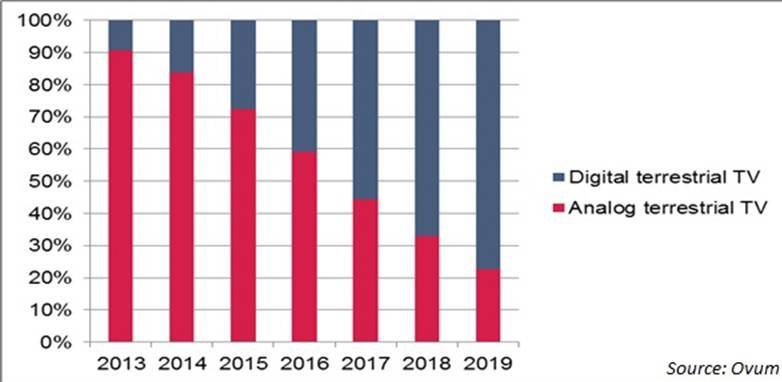 Broadcast experts in Abuja say that paucity of cash and unawareness are threatening Nigeria’s digital migration goal which will weaken government’s voiced commitment to ensure that the country meets the global 2015 deadline. Come June 2015, Africa’s largest economy shall face digital blackout. Stakeholders are putting the blame on the government.
Broadcast experts in Abuja say that paucity of cash and unawareness are threatening Nigeria’s digital migration goal which will weaken government’s voiced commitment to ensure that the country meets the global 2015 deadline. Come June 2015, Africa’s largest economy shall face digital blackout. Stakeholders are putting the blame on the government.
Three things underscore the depressing picture of the sector: The first is lack of awareness amongst the public that analogue switch-off is looming; the second is inadequate funds – governments is releasing to roll out digital TV infrastructure; and the third is insufficient supply of set-top boxes to allow consumers access digital signal on their analogue TV sets after the June 2015.
“The sensitisation is poor and money is not available to drive the entire process. If you ask the NBC [National Broadcasting Commission], they are not likely to give you the true picture. But the fact is , it appears government does not fully understand the implication of not meeting the 2015 deadline, or it might appear that the commitment is just not there within the government to implement all the guidelines to achieve full migration by June 2015” said by one expert who you should know in Abuja. The former director of the NBC who asked not to be named, said “should the NBC fail, blame the government. The cash squeeze is both inexcusable and unbearable.”
A worried Mr. Emeka Mba, the director general of NBC told the ICT Media Group, an association of ICT media publishers in Abuja recently that the Commission was still hopeful for a quick fund intervention from the government. The Commission was exerting the necessary pressure to get funds and execute the set guidelines to achieving digital migration by 2015.
Earlier this year in June, the NBC tested the digital migration scheme in Plateau State using Jos as a pilot scheme. Inside the NBC, the enthusiasm that heralded that pilot scheme in Jos seemed to have waned. Mba and many experts admitted that the challenges surrounding the digital switchover were overwhelming and Nigeria may not just make it. Cash may only address a part of the problem less than nine months to d-day.
“The depth of ignorance on digital migration is frightening. Even in major urban centres such as Lagos and Abuja where knowledge of the 2015 deadline ought to have been strongly entrenched in public space, the information is still not there. People still don’t know. It is as if nothing is expected to happen,” said Engr. Greg Gbadamosi, former zonal director of the Nigeria Television Authority (NTA), the publicly funded TV broadcast company.
Another satellite broadcast expert in Lagos, Mr. Gbenro Johnson said “realistically, nothing fundamental will happen. The deadline is already here. Except by magic or voodoo, 2015 is not feasible.” Johnson argued that since most of the infrastructure is still not on ground; and most of the companies, licensed to provide long distance capacity, are in talking and not doing stage of the digital migration, should be deemed a postponed dream. “It is not just practicable as earlier envisaged. The partners that will host and assist them with the transmission side of the business are not yet mobilised to get the operations running,” said Johnson.
Mba is still optimistic though his conviction appears angled on a compromised outcome. At a forum in Lagos, Mba, while lamenting that the Commission does not have enough fund to execute the digital switch over, said: “The heavens will not fall if Nigeria fails to meet the deadline. Yes, there are implications like signal interference, missing out on new business opportunities that may spring up due to digitisation and the country not being able to compete strongly in the global digital arena, but we will still move on as a country.”
Yes, the country will move on but many TV markets will be forced to switch off analogue TV signal and by doing such, many homes will lose TV reception, leading to advertisers switching away from TV and, in turn, a decline in TV advertising revenue. The first casualty will be the stakeholders in the TV advertisement industry. Then, Revenue will certainly crash.
While Nigeria originally targets at least 80 percent of homes to get digital set-up boxes before the deadline, it appears that figure is no longer realistic. Many stakeholders are already foreseeing the possibility of the country resorting to simulcast, a situation where digital and analogue systems are allowed to run simultaneously.
Many experts, including Mba think it is a more realistic approach to resolving Nigeria’s digital migration logjam. According to Mba, “Even if everything were to be in place as we hope it will be, switch off will not happen until we are sure there is near equal penetration of digital broadcasting to the current analogue system. At least 80 percent of homes will get the digital set boxes before we switch off permanently. If we do not get this till the due date, we may run a simulcast system where the digital and analogue systems operate simultaneously.”
A set-top box (STB) is a device that enables a television set to become a user interface to the internet and also enables a television set to receive and decode digital television (DTV) broadcasts. What some African governments are doing, notably the South African government, is to subsidise the cost and acquisition of STB particularly for low income earners and rural dwellers.
For the International Telecommunications Union (ITU), the global regulator on spectrum, there is no going back on the deadline. The June 2015 date is sacrosanct as it was agreed by all the 193 member-organizations which consists of governments as well as 70 private sector members; Nigeria inclusive. This also means that there will be no more international support for analogue spectrum as any operator still operating on that platform will be technically hedged out after the deadline date.
At its Regional Radio Conference in 2006 at Geneva, the ITU signed an agreement that all members must migrate from analogue to digital broadcasting on or before June 17, 2015. However, this has been difficult for some African countries, unlike their Asian, American and European counterparts that have started if not completed the migration process prior to 2006, when the deadline was fixed.
Digital migration in real sense is a process of converting TV broadcast signals from the current analogue format to digital technology. Currently, 80 percent of television viewing in Nigeria is analogue. As technology is evolving, ITU believes migration will enable more efficient use of radio frequency spectrum, and also ensure better quality pictures and sound.
With digital broadcasting, a number of channels with improved flexibility due to better portable and mobile reception will be served. In addition, services are expected to get more interactive and will meet specific needs of the elderly and disabled by providing them with services like subtitling, audio commentaries or signing.
About 60% of Nigerians still don’t know what digital migration means
An IT Edge News survey (email-questionnaires and field one-on-one interactions in Abuja, Enugu, Lagos, Jos and Kaduna indicate that almost 60% of respondents still don’t know what digital migration means; about 25% have heard of digital migration through the newspapers, and by word of mouth; 15% think they have an idea of what it means but are not so sure. The demography of the respondents indicate that more than 40% are highly educated with higher degrees; 40% have first degrees or diplomas; 20% either have secondary school certificates or have first school/primary school certificates. Of this analysis, 70% own their own TV sets while 30% have never bought a TV set but live in homes with TV sets. More than 55% claim to use satellite TV decoders; while about 30% access TV signals only through terrestrial TV broadcast (NTA, AIT, TVC, etc); about 10% were not sure what satellite TV or terrestrial TV meant. More than 60% have never heard of set-top boxes. About 70% of respondents in Jos, Kaduna and Port Harcourt access free-to-air broadcast signals, notably from Nilesat (Egypt) and MultiTV (Ghana). In all, about 2180 people make up the respondents list. About 5000 people were contacted via email, only about 1,700 responded through email questions. The rest were via direct contacts. This survey was done in three (3) months – May to July, 2014.
This report is written by Knowhow Media International reports-Writer/Researcher: MARTIN EKPEKE
Elsewhere in Africa
The great migration from analogue to digital terrestrial television in Southern Africa
By WENDY ROSENBERG
In most African countries, free-to-air television broadcasting services are currently broadcast in analogue format. Digital broadcasting is far more efficient, allows better picture and sound quality, has capability for enhanced applications (such as electronic programme guides) and ultimately has the potential to increase the amount and variety of television content and increase consumer choice, with many positive economic spin-offs.
The Digital Migration Process
Digital migration usually occurs in a phased transition process. For some time (usually a few years) after digital transmissions commence, existing television services are broadcast in both analogue and digital format. This period is known as the “dual illumination period”. Once a sufficient number of people have migrated to DTT, the analogue transmissions cease, and only the digital transmissions continue (so called “analogue switch-off”).
This yields the single biggest advantage of migrating to DTT in most countries, namely the so-called “digital dividend”. Because so many more channels can be transmitted per frequency in DTT, once analogue transmissions are switched off, a large amount of radio frequency spectrum will be released; which can then be used for new broadcasting and other communications services such as broadband.
Southern African Implementation
Southern African countries have committed to completing the digital migration process by June 2015. If they have not done so by that date, they will not benefit from protection against signal interference. International experience has shown that two of the key factors critical to the success of digital migration are (i) affordable set top boxes and (ii) consumer awareness. This has been borne out by experience in Southern Africa. In order to view digital television signals on an ordinary analogue television set, consumers will need a so-called “set top box”. The purpose of the set top box is to convert the DTT signal for reception on an ordinary analogue television set. This is different to set top boxes in the Pay TV environment, where the set top box is integral to ensuring that only authorised subscribers are able to view the service. In the free-to-air environment, its function is simply that of a digital tuner; a temporary measure pending the availability of affordable television sets with integrated digital tuners (“IDTV”). If consumers haven’t acquired a set top box (or IDTV) by analogue switch-off, they will no longer be able to view the existing terrestrial television broadcasting services.
Affordability of Set Top Boxes
One of the critical success factors identified by the European Union was the “low cost and widely available” set top boxes.
In order to ensure that the migration to DTT is successful, the free-to-air DTT set top box should be a basic affordable set top box with the minimum specifications necessary for its purpose. In order to achieve this, the free-to-air DTT set top box should not have “bells and whistles” requirements which may be “nice to have”, but which would unnecessarily push up the cost of the set top box. One example is a mandatory requirement for an internet connection on the free-to-air DTT STB (e.g. an Ethernet port), as is currently being proposed in Namibia.
Research has shown that there is no consumer demand for interactivity or Internet connectivity through their television sets. Rather, research has shown that televisions are “lean-back” devices, unlike computers and mobile phones, which are “lean-in” devices. Consumers generally prefer to connect to the internet using their computers, mobile phones, and tablets (e.g. iPads), facilitated by mobile telephony. Accordingly, mandating the inclusion of an Ethernet port on a DTT set top box unnecessarily pushes up the cost of the DTT set top box, without a corresponding tangible benefit. Another example of an unnecessary set top box element is so called “set top box control” – a technological mechanism to prevent set top boxes from being used outside a particular country.
Set Top Box Control – A Controversial Matter
Set top box control has led to significant delays and controversy in South Africa. In August 2008, the South African government decided to subsidise the DTT set top boxes for five million of the poorest South African television households, to the tune of about R 2.5 billion. The notion of set top box control was subsequently born in order to protect the state’s investment in subsidised set top boxes, to avoid a situation where set top boxes acquired using taxpayers’ money left the country. Five years on, however, the issue of set top box control has not yet been resolved in South Africa; and the matter has significantly delayed the commencement of the digital migration process.
Set top box control has also been proposed in Namibia, where the Namibian government plans to subsidise set top boxes for many Namibian TV households. Notwithstanding the Namibian government’s investment in DTT set top boxes, set top box control is questionable in Namibia, being the second lowest population density of any sovereign country in the world (little over two million total population, with an average of about 2,77 people per square kilometre). STB control also frustrates the trend towards regionalisation and efforts to remove barriers to trade between SADC countries. If the digital migration process is to succeed, a basic, affordable set top box with no bells and whistles requirements is essential.
Preparing the Consumer
A second critical success factor is consumer awareness. Analogue switch-off should not occur before a sufficient number of consumers have acquired the necessary equipment and migrated to DTT, lest masses of people are cut off from receiving existing analogue television services. Consumer awareness is critical to educate people about the impending migration process, how it will impact them, and the steps they will need to take to ensure that they acquire a set top box (through government subsidies, if eligible, or through their own means) and are able to access DTT. This in turn depends on strong and clear market communication.
A case in point is Tanzania, which, on 31 December 2012, became the first country in the East African community to gradually switch off analogue terrestrial television broadcasting. Despite being the first to “go digital”, Tanzanians have been critical that the migration process took place prematurely. Various NGOs and broadcasters have called for the reinstatement of analogue terrestrial television, to give people more time to purchase set top boxes. In March 2013, Article 19 issued a press release stating that, at the end of December 2012, 50% of Tanzanian TV owners could not access TV services because they did not have set top boxes. Article 19 expressed its concern that Tanzanian consumers had received insufficient information about the new digital technology and about financial assistance in cases when they could not afford set top boxes. In April 2013 the Tanzanian government agreed to temporarily halt the second phase of migration from analogue to digital television broadcasting to assess impact of the first phase on the public.
CONCLUSION
All else considered, the above experience highlights the importance of a phased approach, accompanied by strong and clear market communication, to educate consumers well in advance of digital switch-off.
This is critical to achieving a smooth and successful switchover, to avoid delays, and to achieve the benefits of digital migration within the ITU’s June 2015 deadline.






























